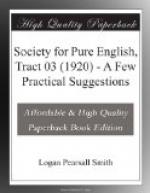There is one curious means by which the life of these words may be lengthened and by which, possibly, they may regain a current and colloquial use. They can be still used humorously and as it were in quotation marks; words like pelf, maiden, lad, damsel, and many others are sometimes used in this way, which at any rate keeps them from falling into the limbo of silence. Whether any of them have by this means renewed their life would be an interesting subject of inquiry; it is said that at Eton the good old word usher, used first only for humorous effect, has now found its way back into the common and colloquial speech of the school.
V. Dialectal and Popular Words.
Whether words may, by conscious effort, be preserved in colloquial usage is an unsolved question, though perhaps our Society may help to solve it; there is, however, another and more certain benefit which its members, or at any rate such of them as are writers, may confer upon the language. There are many excellent words spoken in uneducated speech and dialect all about us, which would be valuable additions to our standard vocabulary if they could be given currency in it. Many of these are dying words like bide, dight, blithe, malison, vengeance, and since these are still spoken in other classes, it might be less difficult to restore them to educated speech. Others are old words like thole and nesh and lew and mense and foison and fash and douce, which have never been accepted into the standard English, or have long since vanished from it, in spite of their excellence and ancient history, and in spite of the fact that they have long been in current use in various districts. Others are new formations, coined in the ever-active mint of uneducated speech, and many of these, coming as they do full of freshness and vigour out of the vivid popular imagination—words like harum-scarum, gallivant, cantankerous, and pernickety—or useful monosyllables and penny pieces of popular speech like blight and nag and fun—have already found their way into standard English. But there




